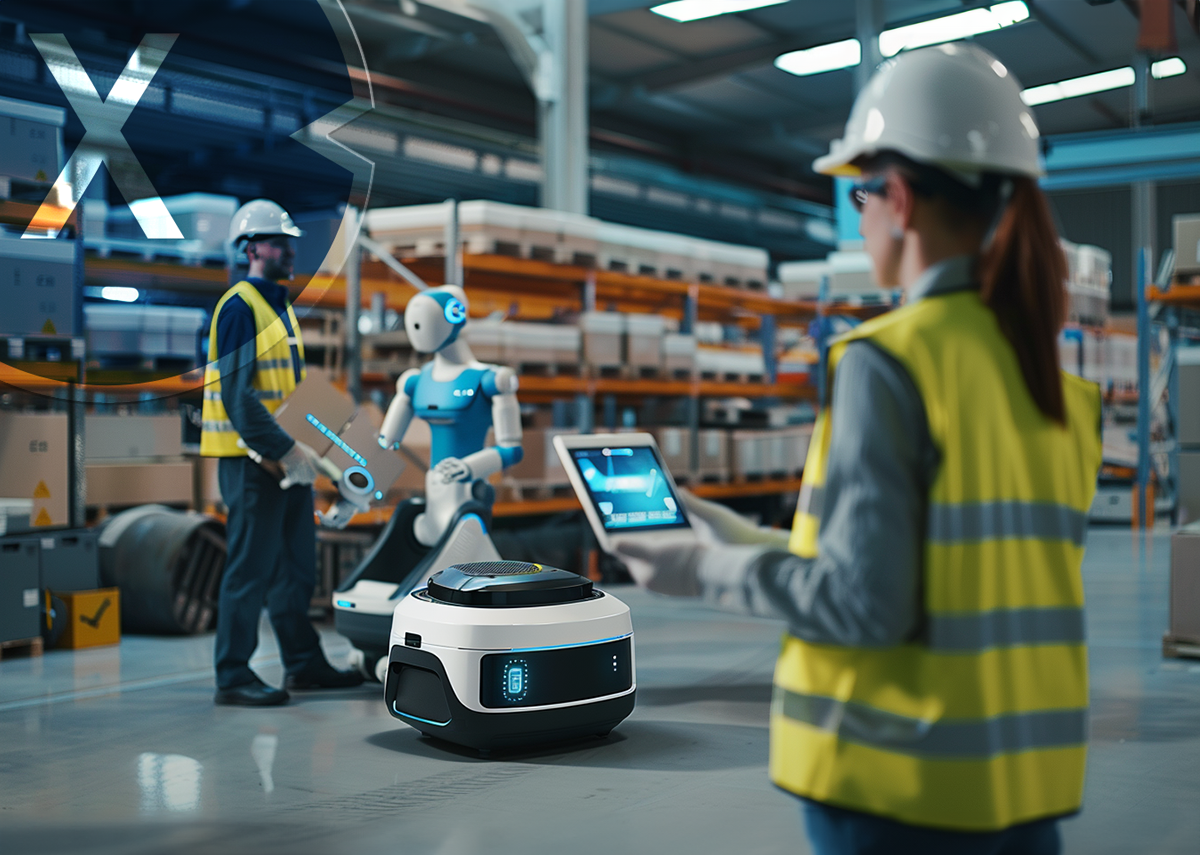
Space optimization in the warehouse: When should the warehouse and logistics be automated and digitized? – Image: Xpert.Digital
📦🔍 Logistics analysis: The right time for automation and digitalization
🧩🚀 Logistics 4.0: The optimal time for automation and digitalization
The question of when to automate and digitize logistics is of central importance for companies seeking to increase their efficiency and competitiveness. Various factors play a role, necessitating a thorough analysis of the supply chain and its optimization potential. Before deciding whether and when automation and digitization make sense, several steps and considerations must be taken into account.
🔍 Supply chain analysis
First, a comprehensive supply chain analysis is essential. Companies must closely examine all their logistics processes. This involves documenting existing workflows and evaluating where weaknesses and bottlenecks occur. Various methods and tools can be used for this purpose, such as value stream mapping or process mapping techniques.
During this phase, companies should also consider the needs and expectations of their customers. Often, additional requirements arise from the customer perspective that might not be immediately apparent when solely examining internal processes. Open dialogue with customers can therefore provide valuable insights and create the foundation for optimizing the supply chain to meet customer needs.
🔧 Identification of areas for improvement
After analyzing current processes, the next step is to identify areas with potential for improvement. These could include inefficient transport routes, delays in order processing, inadequate inventory control, or inconsistent communication processes along the supply chain. The goal is to find those areas that can be significantly improved through automation and digitalization.
An important aspect here is assessing the technological maturity of the solutions. Not every technology is equally suitable for every company. While some companies may already have a high level of technological affinity and the corresponding infrastructure, others may require far greater changes and investments to benefit from automation and digitalization.
🖥️ Technical status review
Before companies invest in automating and digitizing their logistics processes, they should carefully examine the current state of the art. This includes investigating the latest developments in areas such as robotics, artificial intelligence (AI), the Internet of Things (IoT), and blockchain technology. Each of these technologies offers different advantages and can solve specific logistics challenges depending on the use case.
The selection of suitable technologies depends heavily on the individual requirements and specific characteristics of the company. For example, the use of robots and AI may be perfectly sensible in a large warehouse, while for a smaller company, IoT sensors for monitoring supply chain movements and inventory management might be more advantageous.
🚀 Implementation and Integration
Once the appropriate technologies have been selected, the implementation and integration phase begins. This requires careful planning and a phased approach to ensure that business operations are not disrupted during the transition. A pilot project can help identify potential problems early on and gather experience before the technologies are rolled out company-wide.
During implementation, it is also important to involve employees in the process. Training and development programs are necessary to ensure that the team understands the new systems and can use them effectively. Emphasis should be placed on creating a culture of change to avoid resistance and increase acceptance of the new technologies.
🔄 Continuous improvement
The digitalization and automation of logistics is not a one-off process, but requires continuous review and improvement. Systematic monitoring of the new processes and regular audits can help ensure the efficiency of the technologies used and allow for adjustments where necessary. This also includes monitoring technological advancements to enable timely responses to new developments.
✅ Advantages of digitalization and automation
The advantages of digitalization and automation in logistics are manifold. First and foremost, automated systems allow companies to significantly reduce their operating costs. Streamlining processes and reducing manual intervention leads to greater efficiency and less susceptibility to errors. Furthermore, real-time digital data enables better decision-making and faster response times to market changes.
📈 Increased efficiency and cost reduction
Automated systems can take over many repetitive and time-consuming tasks that were previously performed by human workers. This not only reduces error rates but also allows staff to focus on more value-added activities. In the long run, this leads to a significant increase in productivity and a reduction in operating costs.
📦 Improved inventory management
By using technologies like IoT and AI, companies can monitor and manage their inventory in real time. This minimizes the risk of shortages or overstocking and improves warehousing efficiency. Smart sensors and automated ordering processes ensure that there is always enough material available to maintain uninterrupted production.
🔗 Increased transparency and traceability
Blockchain technology and IoT offer a transparent and traceable supply chain. Every product can be tracked from its origin to the end consumer. This is particularly important in industries such as food and pharmaceutical logistics, where traceability and product safety are paramount. Companies can thus not only ensure the quality of their products but also build trust with their customers.
🛣️ Optimized route planning and tracking
Digital technologies enable more precise route planning and shipment tracking. GPS tracking and big data analytics allow companies to identify the most efficient transport routes, thereby saving time and money. Real-time updates on the location and condition of the cargo also improve the predictability and reliability of deliveries.
🌱 Sustainability
Another aspect is sustainability. Through optimized processes, companies can reduce their ecological footprint. Lower energy consumption, reduced emissions, and more efficient resource use contribute to more sustainable logistics. This is a crucial factor, especially in times of growing environmental awareness and stricter legal requirements.
🚀 Promoting innovation
The integration of new technologies also fosters a culture of innovation within the company. Employees are encouraged to develop creative solutions and pursue new approaches to continuously improve efficiency and service. This can lead to a competitive advantage in the long term, as innovative companies are better able to respond to changing market conditions.
⚠️ Challenges of digitalization and automation
Despite the many advantages, there are also challenges to consider when digitizing and automating logistics. One of these is the high initial investment that many companies have to make to implement modern technologies. However, in many cases, these investments can be justified by long-term cost savings and efficiency gains.
Another important point is data security. With increasing digitalization, the risk of cyberattacks and data breaches also rises. Companies must therefore invest in robust security measures to protect their data and systems. This requires not only modern technologies, but also well-trained personnel and clear security protocols.
The adaptability and flexibility of the new systems are also crucial. Technologies are evolving rapidly, and companies must ensure that their systems are scalable and adaptable to respond to future developments.
⚙️ Automation and digitalization of logistics
Automation and digitalization of logistics offer enormous potential for increasing efficiency and reducing costs. However, a sound understanding of one's own processes and a thorough analysis of available technologies are essential to finding the best solutions for each individual company. With strategic planning, continuous improvement, and a culture of innovation, companies can fully leverage the advantages of modern logistics and sustainably strengthen their competitiveness.
📣 Similar topics
- 📈 Discover optimization potential in the supply chain
- 🤖 Integrating technologies like robotics & AI
- 📊 Increased efficiency through digitalization
- 🔍 Make the supply chain transparent
- 🚚 Optimize route planning with GPS tracking
- 💡 Promoting innovation in logistics
- 🔒 Data security in the digital age
- 📦 Manage inventory with IoT
- 🏭 Sustainability through process efficiency
- 📚 Integrating employees into digital processes
#️⃣ Hashtags: #LogisticsAutomation #Digitalization #EfficiencyIncrease #Sustainability #Innovation
Xpert partner in warehouse planning and construction
Xpert.Plus warehouse optimization - high-bay warehouses such as pallet warehouses consulting and planning
We are there for you - advice - planning - implementation - project management
☑️ Smart City & Factory: Industry expert for energetic 5G buildings and halls as well as advice and installation of solar systems
☑️ Xpert.Plus - logistics consulting and logistics optimization
☑️ Industry expert, here with his own Xpert.Digital Industry Hub with over 2,500 specialist articles
I would be happy to serve as your personal advisor.
You can contact me by filling out the contact form below or simply call me on +49 89 89 674 804 (Munich) .
I'm looking forward to our joint project.
Xpert.Digital - Konrad Wolfenstein
Xpert.Digital is a hub for industry with a focus on digitalization, mechanical engineering, logistics/intralogistics and photovoltaics.
With our 360° business development solution, we support well-known companies from new business to after sales.
Market intelligence, smarketing, marketing automation, content development, PR, mail campaigns, personalized social media and lead nurturing are part of our digital tools.
You can find out more at: www.xpert.digital - www.xpert.solar - www.xpert.plus

